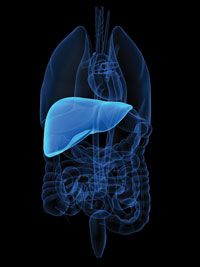Ramucirumab Misses OS Endpoint for Second-Line Treatment of HCC
The phase III REACH trial, which examined ramucirumab (Cyramza) for the second-line treatment of patients with hepatocellular carcinoma (HCC), failed to meet its primary endpoint of overall survival (OS).
liver

The phase III REACH trial, which examined ramucirumab (Cyramza) for the second-line treatment of patients with hepatocellular carcinoma (HCC), failed to meet its primary endpoint of overall survival (OS), as announced by Eli Lilly and Company, the sponsor of the study and developer of the drug.
Though OS favored the ramucirumab arm, data were not statistically significant. However, encouraging activity with ramucirumab as a single agent was observed with meaningful improvements in secondary endpoints of progression-free survival (PFS), overall response rate, and time to progression.
"Although the REACH study did not achieve statistical significance for survival, we are encouraged by the efficacy seen overall, especially in specific subpopulations,” Richard Gaynor, MD, senior vice president, product development and medical affairs for Lilly Oncology, said in a press release. “We plan to discuss these results with regulatory authorities.”
Initiated in 2010, the double-blind phase III REACH study enrolled 565 patients across 27 countries. Patients with HCC were randomized to receive ramucirumab plus best supportive care or placebo following first-line treatment with sorafenib.
Safety data were consistent with previous studies of single-agent ramucirumab, according to the company’s press release. The most common grade ≥ 3 adverse events occurring at a higher rate in the ramucirumab arm compared with the control arm were hypertension and fatigue.
To date, no phase III study of any agent has been able to demonstrate an improvement in survival in the second-line setting of patients with HCC.
In a phase II single-arm study, single-agent ramucirumab demonstrated activity and an acceptable safety profile in the first-line for chemotherapy-naïve patients with HCC. Forty-two patients received ramucirumab at 8 mg/kg every 2 weeks until disease progression or limiting toxicity was observed. Researchers reported a median PFS of 4.0 months (95% CI, 2.65.7), median OS of 12.0 months (95% CI, 6.1–19.7), and objective response rate of 9.5% (95% CI, 2.7–22.6), with 4 patients experiencing a partial response.
Treatment-related grade ≥3 adverse events in this trial included hypertension (14%), gastrointestinal hemorrhage and infusion-related reactions (7% each), and fatigue (5%). One treatment-related death due to gastrointestinal hemorrhage was reported.
Ramucirumab received FDA approval as a single agent in April 2014 for patients with advanced gastric cancer or gastroesophageal junction adenocarcinoma who have progressed after prior fluoropyrimidine- or platinum-containing chemotherapy. The approval was based on an extension in OS observed in the phase III REGARD trial.
Ramucirumab is also being examined as treatment for non-small cell lung cancer (NSCLC).
At the 2014 ASCO Annual Meeting, it was reported in the REVEL trial that adding ramucirumab to standard docetaxel improved OS by 1.4 months versus docetaxel alone in patients with advanced NSCLC.
The study met its primary endpoint with median OS of 10.5 months in the ramucirumab arm versus 9.1 months in the placebo arm (HR = 0.857; 95% CI, 0.751-0.98;P= .0235). The survival benefit was upheld across most patient subgroups, including both squamous and nonsquamous histology.
Grade ≥3 adverse events occurring in >5% of patients in the ramucirumab arm were neutropenia (34.9% vs 28.0% with docetaxel alone), febrile neutropenia (15.9% vs 10.0%), fatigue (11.3% vs 8.1%), leukopenia (8.5% vs 7.6%), hypertension (5.4% vs 1.9%), and pneumonia (5.1% vs 5.8%).
Eli Lilly and Company is currently sponsoring a phase Ib study of ramucirumab in combination with FOLFOX4 for patients with advanced HCC.
Gholam Contrasts Lenvatinib With Other Options in Child-Pugh B HCC
December 21st 2024During a Case-Based Roundtable® event, Pierre Gholam, MD, discussed how post hoc and real-world analyses build upon the limited available trial data for treating patients with unresectable hepatocellular carcinoma with Child-Pugh B status.
Read More